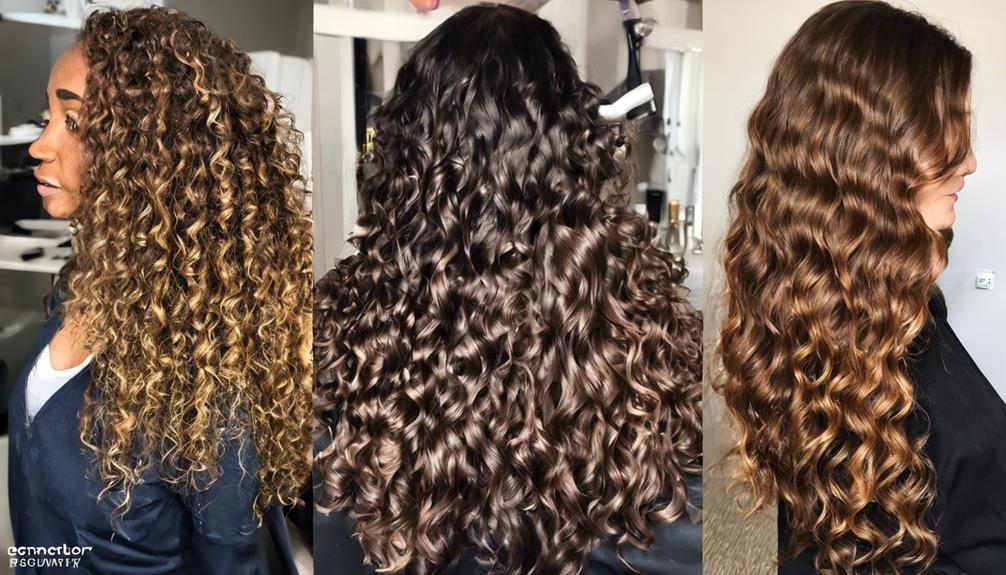Castor oil has long been hailed as a miracle ingredient for promoting hair growth and improving the overall health of your locks. Many people swear by its efficacy, but the question remains: how often should you actually use castor oil on your hair?
Determining the ideal frequency requires considering various factors, such as your hair type, current hair condition, and personal preferences. In this discussion, we will delve into the benefits of using castor oil on hair, factors to consider when determining frequency, recommended frequency for different hair types, application techniques, tips for maximizing its effects, and potential side effects.
So, if you're curious to discover the optimal usage of castor oil for your hair, let's dive right in.
Key Takeaways
- The frequency of castor oil use on hair depends on factors such as hair type, scalp condition, and personal preference.
- Dry and damaged hair can benefit from using castor oil twice a week, while normal hair can use it once a week.
- Oily hair and fine or thin hair can use castor oil every two weeks.
- Different methods of application, such as pre-shampoo treatment or overnight treatment, can be used for optimal results.
Benefits of Using Castor Oil on Hair

Using castor oil on hair offers a plethora of benefits that promote healthy and lustrous locks. One of the primary advantages is its ability to deeply moisturize the hair and scalp, providing nourishment and preventing dryness and brittleness.
This powerful oil contains essential fatty acids, such as ricinoleic acid, which have natural antibacterial and antifungal properties. These properties help combat scalp infections and dandruff, keeping the scalp clean and healthy.
Additionally, castor oil is known for its high vitamin E content, a potent antioxidant that protects the hair follicles from free radical damage, reducing hair breakage and promoting hair growth.
Furthermore, castor oil has the remarkable ability to stimulate blood circulation in the scalp, which encourages hair follicles to receive essential nutrients and oxygen, thereby promoting healthy hair growth.
Another benefit of using castor oil is its ability to thicken the hair strands, giving them a fuller appearance. It also forms a protective layer around the hair shaft, shielding it from environmental damage and heat styling tools.
Factors to Consider When Determining Frequency
When determining the frequency of using castor oil on hair, it is important to consider various factors that can impact the effectiveness and desired results. These factors include hair type, scalp condition, and personal preference.
| Factors | Description |
|---|---|
| Hair Type | Different hair types have varying levels of oil production. Those with dry hair may benefit from more frequent use. |
| Scalp Condition | Individuals with a healthy scalp may use castor oil less frequently compared to those with scalp issues. |
| Personal Preference | Some individuals may prefer to use castor oil more frequently based on their personal hair care routine. |
Understanding these factors will help determine the optimal frequency for using castor oil on hair. It is important to note that excessive use of castor oil can result in a greasy residue and weigh down the hair. On the other hand, infrequent use may not provide the desired benefits. It is recommended to start with a small amount and gradually increase or decrease the frequency based on the results achieved. Additionally, consulting with a hair care professional can provide personalized guidance based on individual needs and goals. By considering these factors, individuals can achieve the desired results from using castor oil on their hair while maintaining a healthy and balanced hair care routine.
Recommended Frequency for Different Hair Types

Different hair types require varying frequencies of castor oil application to achieve optimal results. Understanding your hair type and its specific needs is crucial in determining how often you should use castor oil. Here are the recommended frequencies for different hair types:
- Dry and damaged hair: If you have dry or damaged hair, it is recommended to use castor oil twice a week. This frequency helps to deeply moisturize and nourish your hair, promoting hydration and repairing any damage.
- Normal hair: For those with normal hair, using castor oil once a week is sufficient. This frequency helps to maintain the health and shine of your hair without overloading it with too much oil.
- Oily hair: If you have oily hair, it is best to use castor oil every two weeks. This frequency helps to balance the oil production on your scalp while still providing the benefits of castor oil.
- Fine or thin hair: For those with fine or thin hair, it is recommended to use castor oil once every two weeks. This allows your hair to receive the nourishing benefits of castor oil without weighing it down.
How to Apply Castor Oil on Hair
To effectively apply castor oil on hair, it is important to understand the benefits it offers, the best methods for application, and the recommended frequency for use.
Castor oil is known for its moisturizing and nourishing properties, making it beneficial for promoting hair growth, reducing dandruff, and improving scalp health.
The best methods for application include massaging the oil into the scalp and distributing it evenly through the hair.
It is recommended to use castor oil on hair 1-2 times per week for optimal results.
Benefits of Castor Oil
Using castor oil on hair can provide a multitude of benefits for improving its health and appearance. This natural oil is rich in essential fatty acids, vitamins, and antioxidants that nourish and strengthen the hair follicles, promoting healthy hair growth.
Some of the key benefits of using castor oil on hair include:
- Moisturizes and conditions the hair, preventing dryness and frizz.
- Stimulates blood circulation in the scalp, promoting hair growth.
- Helps repair split ends and reduce breakage, resulting in longer and stronger hair.
- Protects the hair from damage caused by environmental factors such as pollution and UV rays.
Best Methods for Application
To properly apply castor oil on hair and maximize its benefits, it is important to follow the best methods for application. Here are five power-packed techniques to help you achieve the best results:
| Method | Description | Benefits |
|---|---|---|
| 1. Pre-shampoo treatment | Apply castor oil from roots to ends before shampooing. | Nourishes hair, reduces dryness, and improves scalp health. |
| 2. Overnight treatment | Massage castor oil into the scalp and leave it overnight. | Stimulates hair growth, strengthens follicles, and adds shine. |
| 3. Hot oil treatment | Warm castor oil and massage it onto the scalp and hair. | Enhances blood circulation, moisturizes hair, and prevents split ends. |
| 4. Hair mask | Mix castor oil with other natural ingredients and apply as a mask. | Conditions hair, reduces frizz, and promotes healthy hair growth. |
| 5. Scalp massage | Gently massage castor oil into the scalp using circular motions. | Improves blood flow, relieves stress, and stimulates hair follicles. |
Recommended Frequency for Use
For optimal results, it is important to establish a regular frequency for applying castor oil on hair. While there is no one-size-fits-all answer to how often one should use castor oil, following a consistent application schedule can help maximize the benefits.
Here are some recommended guidelines:
- Start with once or twice a week: Begin by applying castor oil to your hair and scalp once or twice a week. This frequency allows your hair to absorb the oil and promotes nourishment.
- Monitor your hair's response: Pay attention to how your hair responds to the treatment. If you notice positive changes, such as improved texture or reduced hair loss, you can continue with the same frequency.
- Adjust as needed: If you have oily hair, you may want to reduce the frequency to avoid excessive oil buildup. Conversely, if your hair is dry or damaged, you can increase the frequency to provide more hydration and nourishment.
- Listen to your hair: Ultimately, the frequency of castor oil application will depend on your hair's needs. Listen to your hair and adjust accordingly to achieve the best results.
Tips for Maximizing the Effects of Castor Oil
To optimize the efficacy of castor oil, consider implementing these practical strategies.
Firstly, ensure that your hair and scalp are clean before applying the oil. This will allow the oil to penetrate deeply and work its magic. Additionally, gently massage the oil into your scalp for a few minutes to stimulate blood flow and promote better absorption. This will enhance the oil's effectiveness in nourishing your hair follicles and promoting healthy hair growth.
Another tip to maximize the effects of castor oil is to cover your hair after application. This helps to create a warm and moist environment, allowing the oil to penetrate deeper into the hair shaft and provide maximum hydration. You can use a shower cap or wrap your hair in a warm towel for this purpose.
Consistency is key when using castor oil. It is recommended to use it regularly, at least once or twice a week, to see noticeable results. However, avoid overuse as it may lead to excessive oiliness and weigh down your hair.
Lastly, consider leaving the oil on overnight. This allows the oil to work its magic while you sleep, giving it ample time to deeply nourish and hydrate your hair and scalp.
Potential Side Effects and Precautions

Before incorporating castor oil into your hair care routine, it is important to be aware of potential side effects and exercise caution. Some individuals may experience allergic reactions or sensitivities to castor oil, so it is advisable to perform a patch test before using it extensively.
Additionally, overuse of castor oil can lead to excessive oiliness or greasiness in the hair, so it is recommended to use it in moderation and adjust the amount based on your hair's needs.
Allergic Reactions and Sensitivities
Using castor oil on hair can potentially lead to allergic reactions and sensitivities, necessitating the need for caution and awareness of potential side effects. It is important to understand that while castor oil is generally considered safe for topical use, some individuals may develop adverse reactions.
Here are some potential side effects and precautions to consider:
- Allergic Reactions: Some people may be hypersensitive to castor oil and experience symptoms such as itching, redness, or swelling. If you notice any of these signs, discontinue use immediately and consult a healthcare professional.
- Skin Sensitivities: Castor oil is a thick and heavy oil that can clog pores or cause breakouts in individuals with sensitive or acne-prone skin. It is recommended to perform a patch test before applying it to your scalp or hair.
- Eye Irritation: Be cautious when applying castor oil near the eye area, as it may cause irritation or discomfort. If it comes into contact with your eyes, rinse thoroughly with water.
- Digestive Upset: While this is not directly related to hair usage, it is worth mentioning that ingesting castor oil can cause stomach cramps, diarrhea, and nausea. Avoid oral consumption unless directed by a healthcare professional.
Excessive Oiliness or Greasiness
Excessive oiliness or greasiness is another potential side effect to be aware of when using castor oil on hair, necessitating the need for caution and proper application techniques. While castor oil is known for its moisturizing properties, using too much can lead to an overproduction of sebum, resulting in an oily and greasy appearance. To avoid this, it is important to use castor oil sparingly and to properly distribute it throughout the hair. The following table provides some tips and precautions to prevent excessive oiliness or greasiness when using castor oil on hair:
| Tips and Precautions for Preventing Excessive Oiliness or Greasiness |
|---|
| Use a small amount of castor oil |
| Dilute castor oil with a carrier oil |
| Apply the oil evenly throughout the hair |
| Avoid applying the oil directly to the scalp |
| Use castor oil as a treatment rather than a daily moisturizer |
Frequently Asked Questions
Can Castor Oil Be Used on All Hair Types?
Castor oil can be used on all hair types due to its nourishing properties. It helps moisturize the scalp, promote hair growth, and reduce hair damage. However, the frequency of use may vary depending on individual hair needs and preferences.
Can Castor Oil Help With Hair Growth?
Castor oil has been shown to promote hair growth due to its high content of ricinoleic acid, which has anti-inflammatory and moisturizing properties. It is recommended to use castor oil on hair 1-2 times a week for optimal results.
Can Castor Oil Be Used as a Leave-In Treatment?
Castor oil can be used as a leave-in treatment due to its nourishing properties. It helps to moisturize and strengthen the hair, promoting healthy growth. However, it is important to use it in moderation to prevent excess oil buildup.
Can Castor Oil Be Used on Chemically Treated or Colored Hair?
Castor oil can be used on chemically treated or colored hair, as it has moisturizing and nourishing properties. However, it is important to consider the individual's hair type and condition, and consult with a professional to determine the appropriate frequency of use.
Can Castor Oil Help With Dandruff or an Itchy Scalp?
Castor oil has been known to help with dandruff and soothe an itchy scalp due to its antimicrobial and anti-inflammatory properties. Regular application, as recommended by a dermatologist, can yield positive results.
Conclusion
In conclusion, the frequency of using castor oil on hair depends on individual hair type and the desired results. It is generally recommended to use castor oil once or twice a week for most hair types.
However, those with oilier hair may need to use it less frequently, while individuals with dry or damaged hair may benefit from more frequent use.
Proper application techniques and precautions should also be followed to maximize the benefits and minimize potential side effects.




